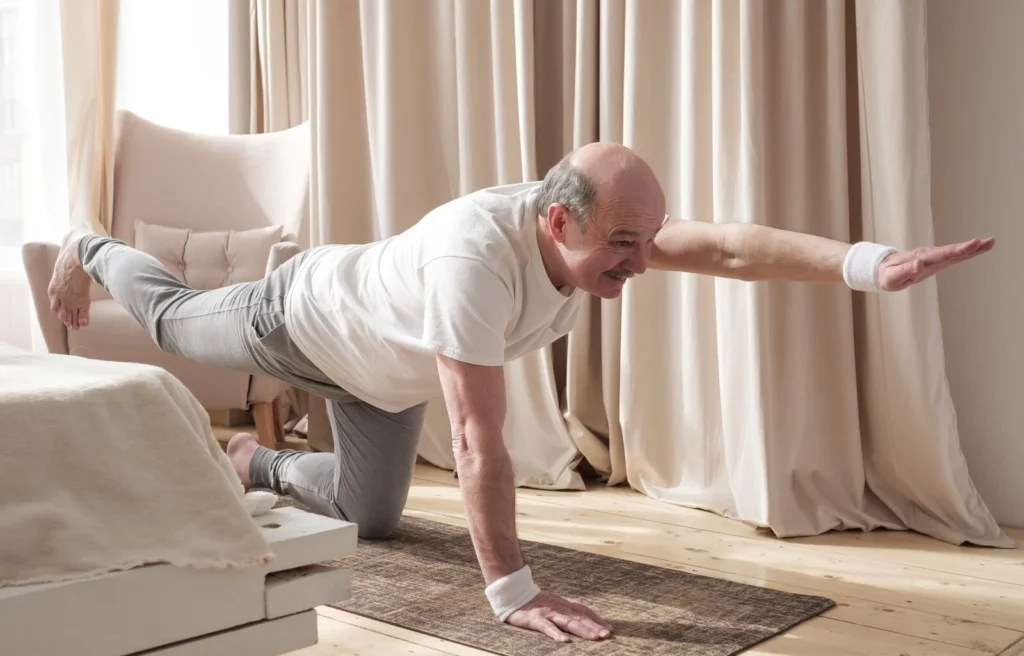The Link Between Core Strength and Senior Independence
Most people hear “core” and think of sit-ups or flat abs. But your core isn’t just about looks—it’s your body’s stability center. It helps you stay upright, balanced, and safe. And as you age, weak core muscles can quietly chip away at your mobility and independence.
If you’ve been feeling less steady, struggling to stand up from a chair, or avoiding certain movements, your core might be part of the problem. The good news? Strengthening it can change everything.
Why Core Strength Matters More as You Age
Your core includes more than just your abdominal muscles. It also involves your:
-
Lower back
-
Pelvic floor
-
Hips and glutes
-
Deep stabilizing muscles around the spine
Together, these muscles control posture, support balance, and power movement. When they weaken with age, so does your ability to move confidently.
A Weak Core Can Lead To:
-
Poor posture and spinal misalignment
-
Increased risk of falling
-
Difficulty walking or turning
-
Trouble standing from a seated position
-
Slower reaction times when catching yourself
Bottom line: Weak core = unstable foundation.
How Physical Therapy Helps Restore Core Strength
At Synaptic Rehabilitation, we often see older adults regain their mobility by simply improving the strength and function of their core. Here’s how therapy makes it happen:
Individualized Assessment
We begin by evaluating your posture, strength, balance, and how your body moves during everyday tasks. This helps us pinpoint weak spots and design a safe, effective plan.
Targeted Core Exercises
We focus on practical movements—not just crunches. Think:
-
Seated marches to engage deep core stabilizers
-
Standing trunk rotations
-
Bridges for glute and pelvic floor strength
-
Bird-dogs and planks (modified as needed)
-
Balance drills that force core engagement
These exercises build the kind of strength that directly improves walking, bending, standing, and reaching.
Functional Movement Training
Core strength doesn’t mean much unless it supports real-life actions. That’s why we integrate movements like sit-to-stands, carrying light loads, or reaching overhead—things you do every day.
Related: [What is “functional strength”—and why does it matter as you age? (Coming Soon)]
What a Stronger Core Means for You
Building core strength isn’t just about preventing problems—it’s about regaining freedom.
Benefits Include:
-
Better posture and alignment
-
Easier walking and stair-climbing
-
Fewer falls and near-misses
-
Reduced lower back or hip pain
-
More confidence doing everyday tasks
-
Less reliance on assistive devices
“We often see patients go from hesitant and hunched to upright and confident within weeks of focused core training,” says our team at Synaptic Rehab.
Don’t Let a Weak Core Hold You Back
If you’re struggling with balance, movement, or getting around like you used to, it might not be “just aging.” It might be your core crying out for attention.
And the best part? It’s never too late to strengthen it.
Let’s Build Your Strength from the Center Out
At Synaptic Rehabilitation in Bridgewater, NJ, we help older adults move better, stand taller, and live more independently through evidence-based physical therapy.
📍 Visit us in Bridgewater, NJ
📞 Call: 908-801-6425
🌐 Request a consultation
Steven Cheung, DPT
Steven is the founder and lead physical therapist at SYNAPTIC Rehabilitation. He earned a BS in Exercise Science Applied Kinesiology from Rutgers University in New Brunswick, NJ and his Doctorate degree from American International College in Springfield, MA. Steven specializes in movement disorders such as Parkinson’s disease and many other neurological disorders. Outside of practicing physical therapy Steven enjoys time with his wife, running, and staying active.

